How to Grow a Business in 190 Markets: 4 Lessons from Airbnb
16 January 2017 Update:
In 2015, we first published this case study on Airbnb’s global growth.
Now, almost 2 years later, Airbnb is not slowing down anytime soon, with further expansions, acquisitions, and new products in 2016, including the much-hyped Airbnb Trips.
With so much growth under its belt, we thought it’d be a good time to take another look at the tactics that first launched Airbnb to the world.
We hope you enjoy the new Slideshare format and focus on global marketing:
Few companies have had the kind of global success of Airbnb. Seven years ago, the company started in San Francisco, by allowing people to turn their spare bedrooms and homes into vacation rentals. Today, Airbnb has over 1,000,000 listings in 34,000 cities and 190 countries. It’s on pace to list more rooms than the entire Marriott empire. And it continues to expand aggressively into new foreign markets: when Cuba became more open to American businesses last December, Airbnb jumped in. It already has more than 1,000 listings there.
How did Airbnb become a worldwide success so quickly? In part, it’s by offering a great product. The business also grows in overseas markets by acquiring rivals and clones.
But international expansion is tricky even for the best companies, let alone international expansion that encompasses more than 190 countries. In this post, we’ll share some of the lesser-known tactics that made Airbnb a global success.
Get Localization Right
As a brand, Airbnb wants to present itself as a global citizen. So, like any global citizen, it has made it a priority to branch out into new languages. “It’s important that we are both international and local at the same time,” says Jason Katz, an engineer at Airbnb. “Because of this, we’ve taken many steps toward localization, one of which is translation.”
Today, Airbnb is available in 26 different languages, allowing it reach users around the world. Managing a dynamic website in 26 languages is difficult, but Airbnb has made localization smooth through a number of smart engineering moves.
“[As a global startup, it’s] important that we are both international and local at the same time. Because of this, we’ve taken many steps toward localization, one of which is translation.” – Jason Katz-Brown, Software Engineer at Airbnb.
Interested in app localization? Check out our free Essential Guide to App Localization.
A platform designed for localization
Airbnb’s engineers have built a customized, highly sophisticated translation management tool (TMS) that helps the company add new languages and update existing content easily.
The tool has some clever features. Whenever a new phrase is added to the site, the TMS automatically takes a screenshot and sends it to translators. Translators can right-click on any phrase on the site and then edit the translation in context. And translation changes go live on the site almost immediately.

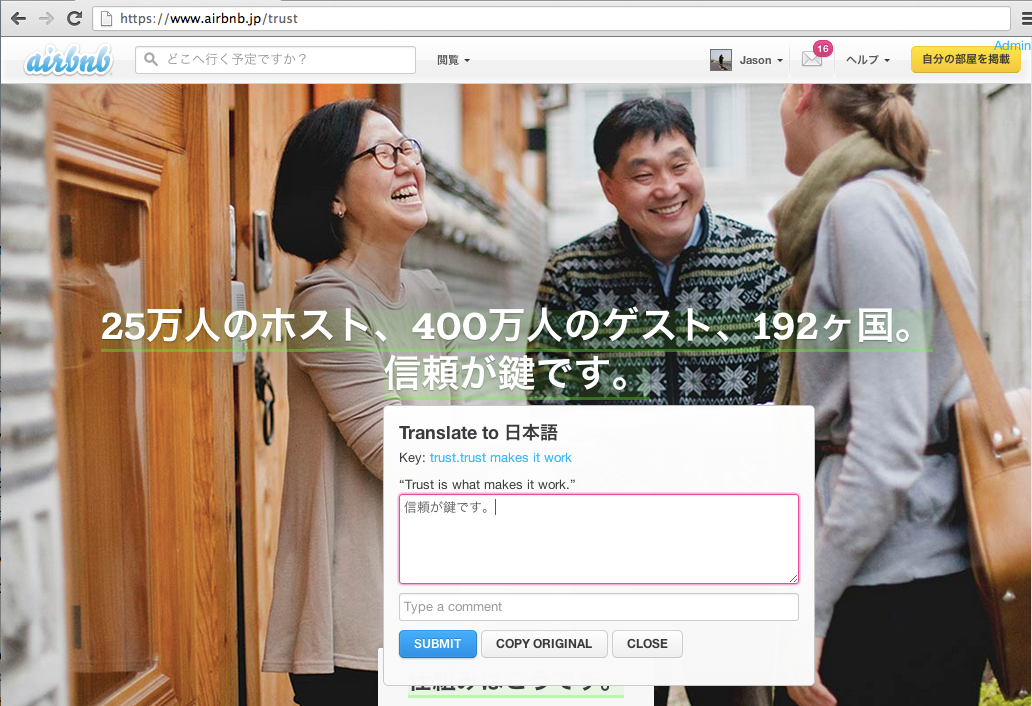
Data-driven prioritization
All this engineering acumen lets Airbnb respond quickly to new localization challenges. For example, a week before the company’s CEO visited Tokyo, Airbnb decided to localize its Japanese site. At the time, that meant handling 400,000 words of English content across websites and mobile apps.
There’s pretty much no way to get that much high-quality translation, that quickly. So Airbnb engineers built an ingenious system to prioritize content by counting the number of users that looked at any given piece of text over the course of four days, and then flagging all the text that received more than a certain frequency of views from Japanese users.
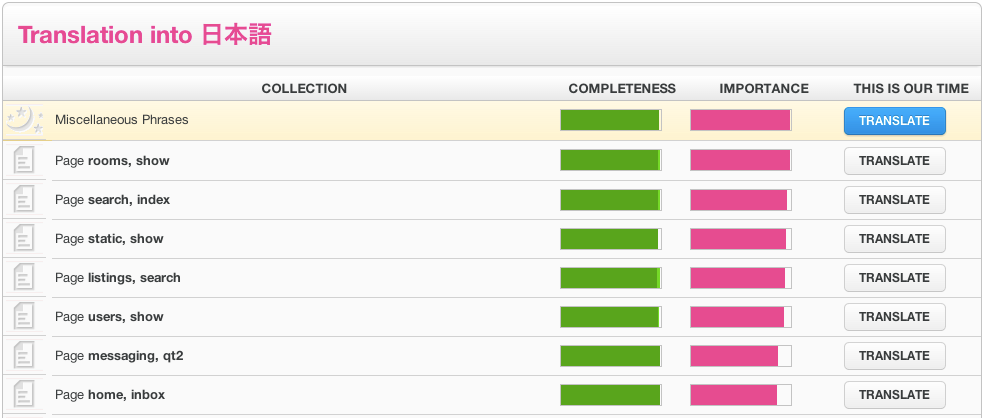
As a result, translators could work efficiently, by focusing on the most used parts of the site, and produce a workable translation in just a week.
Airbnb’s engineering team also made an open-source product called Polyglot.js to enable JavaScript for internationalization.
Pay close attention to language variants
Languages are living things, and they vary widely from place to place. The kind of Chinese that’s used in mainland China, for example (Mandarin with Simplified Chinese writing) differs dramatically from the Chinese that’s used in Hong Kong (Cantonese with Traditional Chinese writing).
Some companies ignore these distinctions. But, in its localization campaigns, Airbnb has paid close attention to these kinds of variants, with sites that are localized for specific forms of languages.
Nice localization, @Airbnb_SG pic.twitter.com/EbGcFUGMcl
— Vishnu Prem (@burnflare) April 22, 2014
Language variations often have to do with spelling, and Airbnb’s engineers have built an application to automate the process of switching spellings from country to country. For example, the app will automatically adjust the spelling of English words for the American, British, and Canadian versions of the site (changing, say, “colour” to “color”), as well as certain usages (changing, say, “vacation” to “holiday”). The site even swaps out ß for “ss” when converting from its German-German to Swiss German versions. The result is an experience that is truly tailored to the local users.
Build a translator community
It’s hard for a young, growth-oriented startup like Airbnb to translate so much content, so quickly. In order to speed up translation, Airbnb has used a mix of crowdsourcing and in-house translation work. Early in the localization process, the company recruits translators from the crowd, and uses its worldwide community of hosts and guests to help with both translation and proofreading. Crowd-sourced translation is cheap, quick, and great for building a sense of community. But it can have problems with accuracy and consistency. That’s where Airbnb’s in-house professional translators and localization managers come in, checking translations and making sure everything fits the brand’s tone.
Global Content Marketing
Great marketing drives growth. But a storyline, campaign, or graphic that works well in one country might be ineffective (or even offensive) in another. Airbnb tackled the challenge of marketing localization through a mix of top-down and bottom-up strategies.
The top-down approach
Airbnb created highly targeted campaigns by leveraging the data from their large user base. For example, Airbnb wanted to develop a new marketing video for East Asia. They knew that the most popular queries in the region were about how to search for a listing, book a room, create a wish list, and contact hosts or Airbnb itself. So they put together a video that features a young Asian woman planning a trip—and dealing with all these questions.
//
Airbnb旅人指南 - 如何預訂房間
The video is partly a marketing tactic, and partly a way to cut down on customer service requests by educating users. It’s tailored to East Asian audiences, and it uses localized voiceovers for people on country-specific Airbnb sites. Jasmine Maleknia, a social media manager for Airbnb, explains that voiceovers are part of their localization strategy, “because cultural nuances are lost in translation on subtitles.”
Bottom-up
“The real challenge of global strategy isn’t how big you can get, but how small you can get.” – Dennis Goedegebuure, former head of Global SEO at Airbnb.
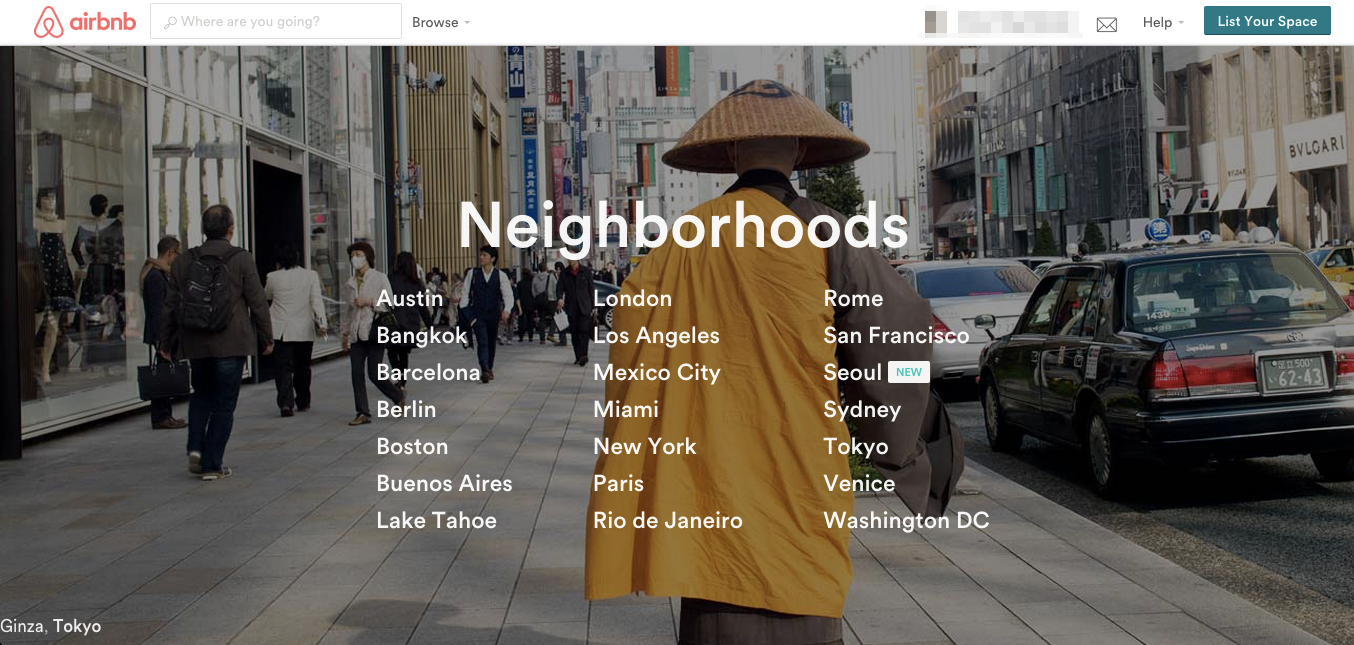
There’s more than one way to run a global marketing campaign. And Airbnb has had luck with bottom-up marketing efforts, too. After all, the company is community-driven, and it has a built-in network of users who can help tailor marketing to their own countries.
For example, the Neighborhood section of the site has around 580 pages, spread over 20 cities, and localized to more than 30 local Airbnb sites around the globe. Airbnb builds each neighborhood site, and then contracts with thousands of local photographers and videographers to provide the core content. This far-flung network of freelancers lets each neighborhood’s page develop a distinctive, authentic, and local feel.
“The real challenge of global strategy isn’t how big you can get, but how small you can get,” says Dennis Goedegebuure, the former head of Global SEO at Airbnb. It’s a good point to keep in mind: when many developers launch a global strategy, they keep everything centralized. But the best localized content will always come from local partners.
Leverage Word-of-Mouth
“Our users tell the story better than we do.” – Gustaf Alstromer, Growth Product Manager at Airbnb
For Airbnb, word of mouth is critical to growth. So the company built a referral program that encourages travelers to promote Airbnb by offering travel credits to both the referrer and the recipient.

As part of its global strategy, Airbnb tailored this referral system to certain overseas markets, especially in Asia. Because people in East Asia tend to browse more through mobile devices, Airbnb made sure that its referral program there was available for mobile users. They also integrated it with the kind of messaging apps—Whatsapp, WeChat, and Weibo—that are popular in the region.
Learn more about the best ways to do app distribution in East Asia here.
Airbnb found that a few key influencers in Asia could have a big impact. One online celebrity, called Anthony, has 2 million followers on Weibo. When he posted an Airbnb referral code, he was able to singlehandedly bring in thousands of signups.
Offline, Guerrilla Tactics for Supply
“Immaculate growth is amazing. But also get into the real world.” – Rebecca Rosenfelt, Growth Product Manager, Airbnb
When acquiring new hosts in some countries, Airbnb learned that they can’t rely on online tactics alone. Sometimes, people need to talk, face-to-face, with a human being. And those needs can vary from culture to culture.
For example, in France, Airbnb found that Facebook ads were ineffective. So they sent teams of two to three people to France in order to meet potential hosts, host info sessions, set up booths at local events, and post flyers, among other outreach tactics. The on-the-ground approach yielded a CPA that was five times better than Facebook ads.
More recently, a similar approach has been successful in Cuba, Airbnb’s newest territory.
As is often the case with localization and global expansion, Cuba poses some unique challenges. Credit cards aren’t supported there, and the island has limited Internet coverage. Airbnb was able to partner with casas particulares—small, traveler-friendly lodgings—in order to get on the ground in Cuba. Casas particulares are the middlemen with Internet access, and these helped Airbnb to solve problems of taking orders. They also solved the payment issues by working with a remittance company in Miami. With a little flexibility, Airbnb has been able to quickly establish a foothold in a growing new overseas market.
Potential Challenges in the Future
Despite the rapid expansion, there are potential challenges for Airbnb in the future, too.
The legal issues surrounding the Sharing Economy
Regulators are beginning to pay more attention to the kind of semi-formal, sharing economy transactions that Airbnb facilitates. Not all governments are happy with what they’re finding—for example, there’s increasing pressure in Paris to inspect Airbnb listings due to the rapid growth in local hosts.
Getting into More Conservative Culture
Airbnb values a culture of openness, and the system requires people to be comfortable interacting with foreign strangers in their own homes. Those values may be less familiar in some places. In Japan, for example, where collectivism and the avoidance of uncertainty are highly valued, Airbnb can be a tough sell.
Retaining Users with Great Hospitality
Getting users is great, but Airbnb also has to keep them. As the company becomes a major global force, it has to figure out new ways to retain users. Recently, Airbnb slows down the expansion of its international operations, and appoint Chip Conley as Airbnb’s head of global hospitality. And the Dublin hub is doubled in size to foster better customer services and hospitality. Whether Airbnb can grow its hosts into 21th century’s representative of hospitality, becomes the biggest challenge for the company.
Key takeaways for marketers
Few companies have expanded overseas as rapidly as Airbnb over the past few years. Its international strategies are relevant to your growth plans. Growth marketers, let’s take notes.
Local experience is a must
Sure, your app is in English. But for most of the people on earth, that means that the ideal user experience will be localized user experience. English is becoming a lingua franca, but most people don’t speak it—and those that do generally prefer their native language, anyway.
As Airbnb demonstrates, a better localized product will also be a more successful product. Good translation is the first step for localization, but it’s not everything—culture-specific touches, and localized marketing, can help make an app a truly global player.
Do things that don’t scale
Techies are hesitant about offline marketing campaigns, because they can’t really be scaled. But here’s the thing: not everyone is tech-savvy. And people’s questions about a company’s services might not be addressed by an online ad (especially when that services involves something as personal bringing strangers into their homes, as with Airbnb).
Paul Graham’s famous saying, “Do things that don’t scale,” should apply to offline stuff, too. Diverse, offline marketing tactics, tailored to particular places, can be the difference between a tepid response and a runaway success.Taking an experimental approach to try every tactic you know in each market can often lead you to success.
Your Turn
Global expansion is hard. But by focusing on international growth from the start, and adapting yourself to the needs of new markets, it’s possible to succeed around the world.
Ready to get started on your own app localization process? Check out our free step-by-step essential guide (click below):

Reference: Airbnb: The Growth Story You Didn’t Know
About OneSky
OneSky provides seamless end-to-end localization solutions for thousands of mobile apps, games, websites, and businesses worldwide. We offer professional translation services in 50+ languages and a translation management system (TMS) with API integrations and plugins to streamline your workflow. We hire and carefully screen our own translators to ensure the highest control over quality. Using OneSky’s powerful QA features, cross-functional teams collaborate efficiently to deliver faster release cycles and higher quality translations. See how you can go global at www.oneskyapp.com



 Written by -
Written by - 



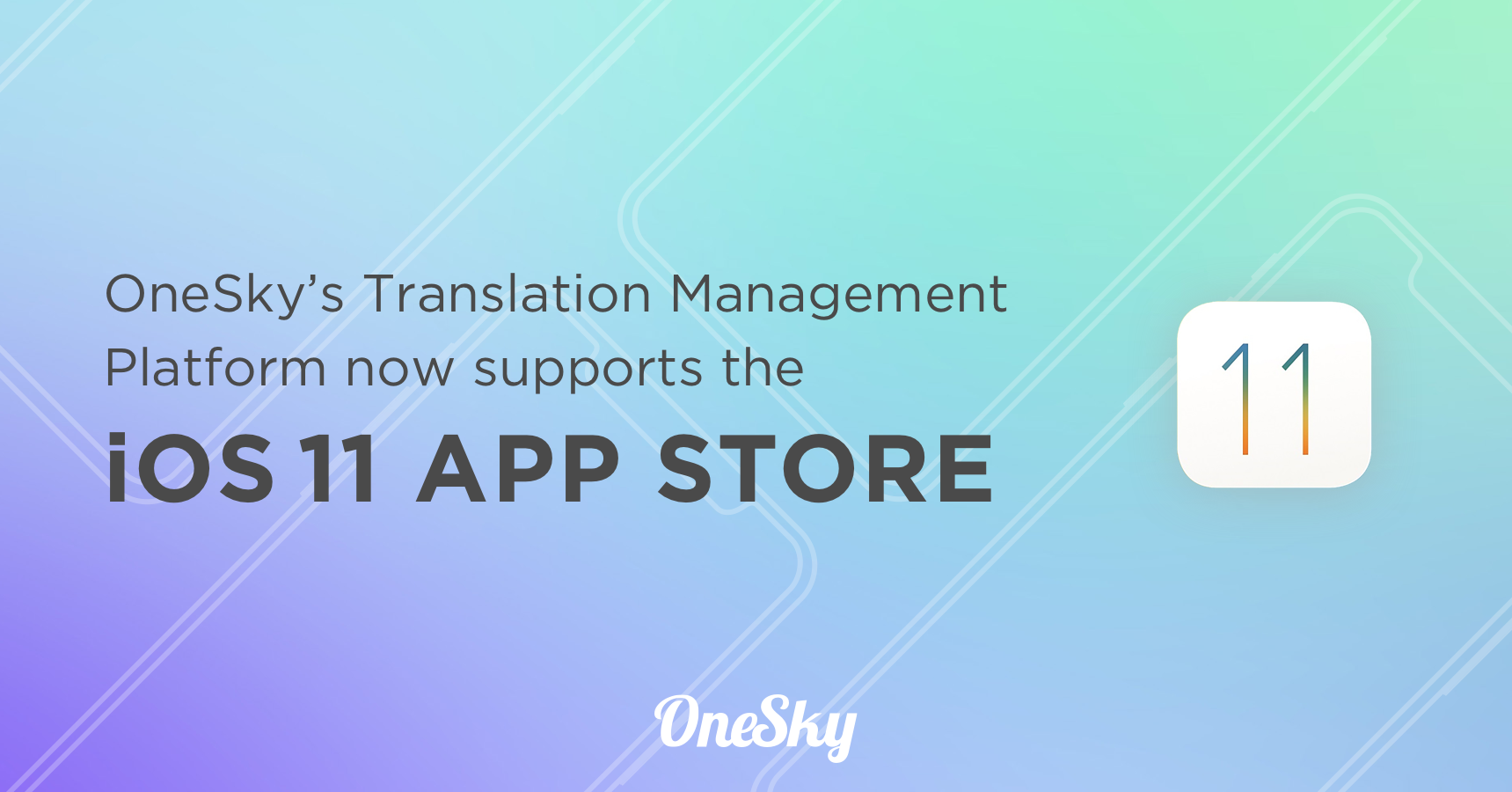
 Written by
Written by 

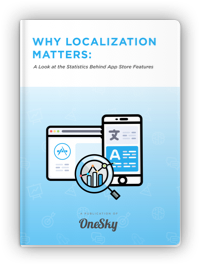
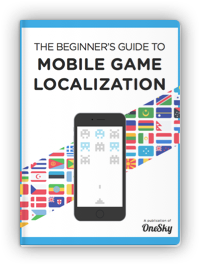
Hey Patrick, I totally agree with you that it’s important to get as close to the local audience as possible, so every type of localization – native language, as you mentioned is very welcomed.